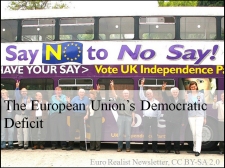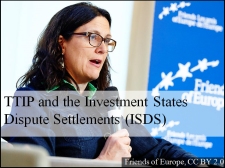Commentary by Robbie PYBURN
If the European Commission is to be believed, the controversial Transatlantic Trade and Investment Partnership (TTIP) will boost Europe’s economic growth and create much-needed jobs on both sides of the Atlantic. However, behind the spin is a trade agreement that completely disregards the democratic rights of European citizens in favour of satisfying the aggressive demands of multinational corporations.

The nature of the on-going negotiations is worrying in itself. Despite being told that talks would be transparent, they have remained secretive since they began last year. As a result, the public have been forced to rely on leaked documents, old drafts of TTIP chapters, Freedom of Information requests, and terms of similar negotiations (CETA, TPP, NAFTA) to understand what is being agreed on.
In basic terms, TTIP aims to remove trade tariffs and “unnecessary barriers” that restrict the potential profits of US and EU businesses by opening up a free-trade market. However, these so-called barriers represent principles and standards that the EU prides itself on: environmental regulations; health and safety standards; labour rights; and a commitment to steer public services to benefit society.
The EC has said that it will “harmonise” food and health regulations with the US, but given the US’s more relaxed standards in the sector, this may mean compromising rather than harmonising. A report by War on Want lists the EU’s restrictions on GM foods, harmful pesticides and bovine growth hormones (linked with cancer) as examples of “unnecessary” trade barriers to US companies. Similarly, EU restrictions on toxic chemicals are far stricter, with companies having to prove substances to be safe before they go on the market. In the US, a substance can be used until proven unsafe. While proponents of TTIP claim the US will up its standards to meet those of the EU, the reality of negotiation means that both sides may have to make compromises.
Contrary to pro-TTIP arguments, the EC admitted in 2013 that the pact would cause a “prolonged and substantial” threat to European workers as jobs would move to the US, where labour standards and trade union rights are lower. The results of similar bilateral trade agreements support the case for job losses as well.

TTIP will endanger governments’ ability to regulate – and citizens’ rights to access – services such as water, health and energy, according to a Transnational Institute report. Big businesses have successfully lobbied against the EC’s attempt to exclude public services from TTIP. In the worst case scenario, present and future liberalisations and privatisations of public services could be “locked in”, making re-nationalisation of services virtually impossible. The potential liberalisation of health and social care would also make it incredibly difficult to adopt new regulations in the sector.
Local authorities across Europe have publicly opposed the deal, as TTIP will limit their ability to purchase goods and services from the private sector. EU Directives currently allow public authorities to consider environmental and social factors when awarding public contracts. This may include buying fair-trade or organic produce, choosing renewable energy sources, or procuring from local businesses. TTIP threatens to scrap “buy local” initiatives, giving multinationals more access to regional procurement markets, at the expense of the environment and the small and medium-sized enterprises the pact claims to benefit.
Perhaps the most controversial aspect of TTIP is the possibility of an Investor State Dispute Settlement (ISDS), which would allow companies to sue the EU and member states for vast sums if regulatory changes result in a loss of profits. Similar past cases include tobacco giants Philip Morris suing Uruguay over anti-smoking legislation involving cigarette packaging, and energy company Vattenfall suing Germany for opting to phase out nuclear power plants in wake of the 2011 Fukushima disaster. Policies regulating public services, such as capping water prices and reversed privatisations have already been targets of ISDS claims. We could easily end up in a situation where countries that implement legislation to protect and benefit their citizens or the environment can forced to pay out billions to companies whose profits have been reduced.
With TTIP, Europe finds itself at a crossroads. And the decision we make will not only reflect how we value democracy, but it will set the precedent for the power we give governments and corporations over our lives in future. While a tariff-free all-American TTIP steak may seem like a great deal, it’s not worth jeopardising the essential rights of our governments and citizens for it.
RELATED ARTICLES:






Reblogged this on debate no hate.
LikeLike